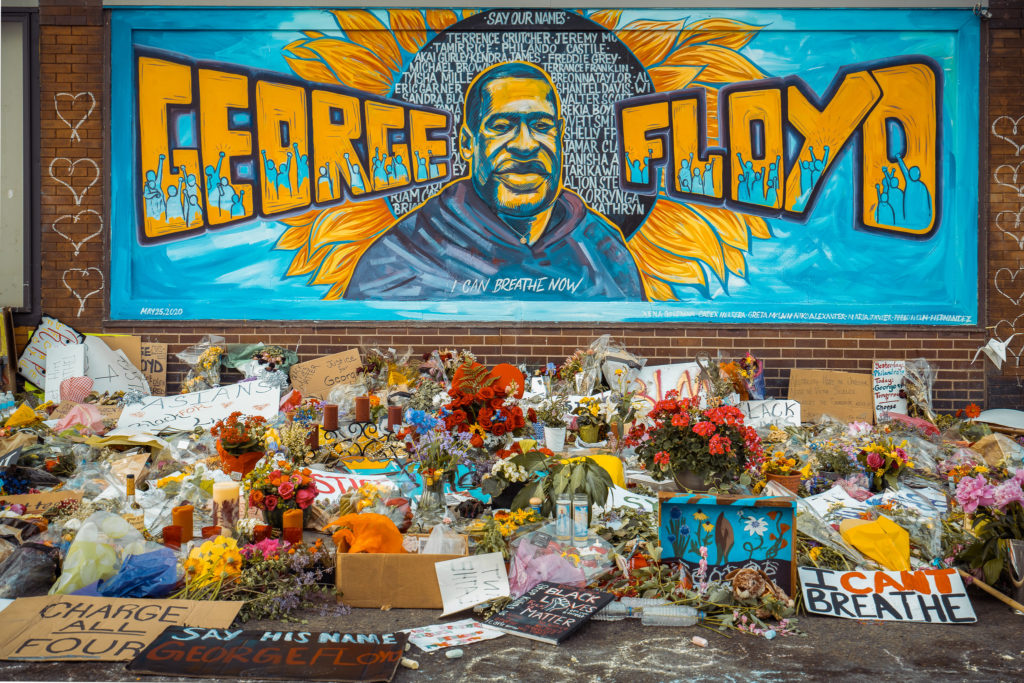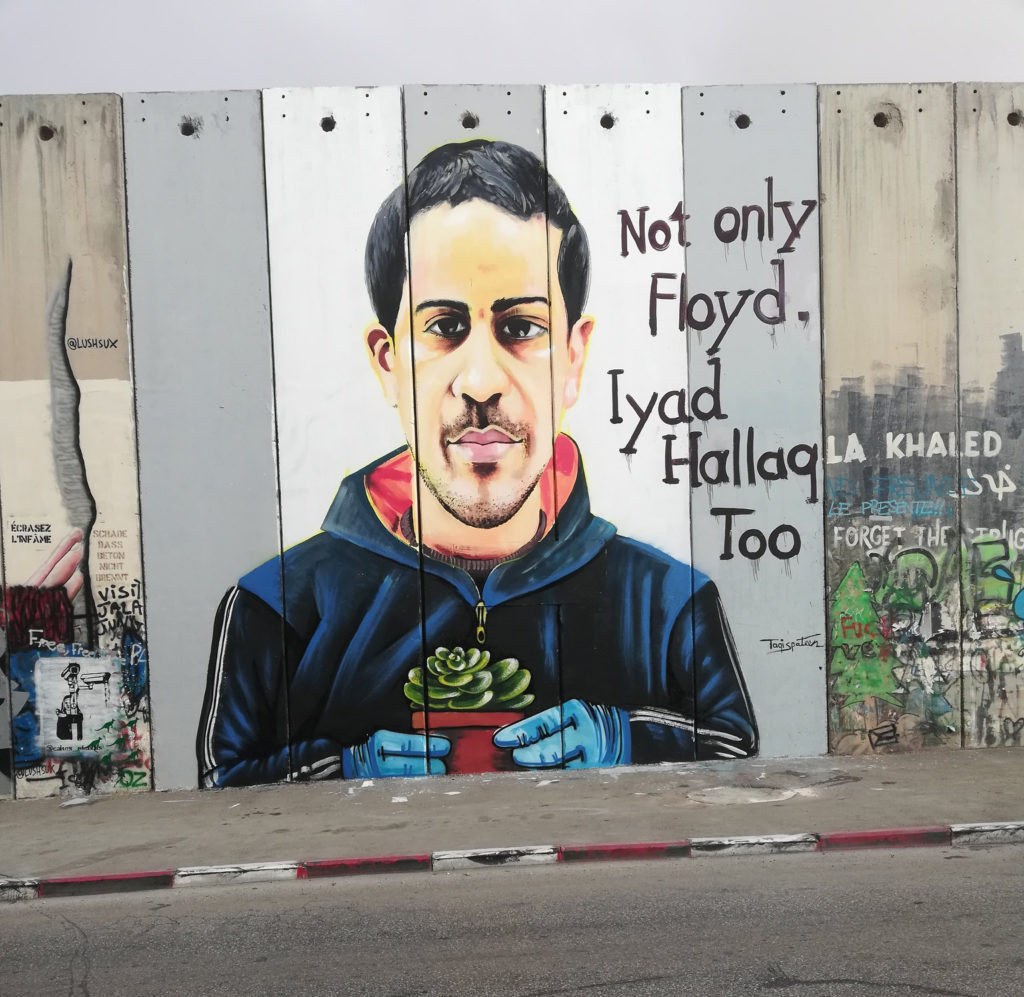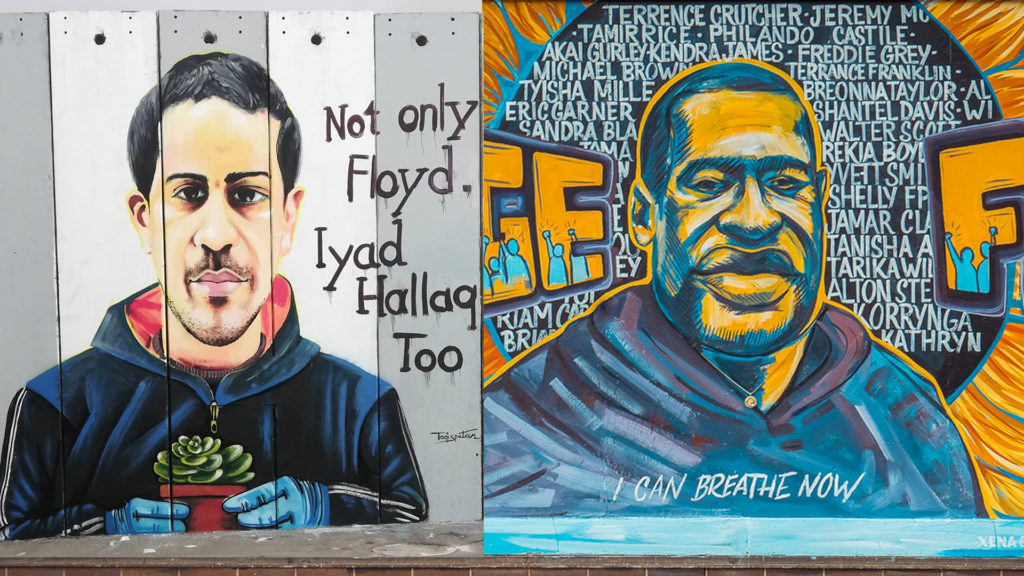Palestinian Lives Matter
The police officer who killed George Floyd was sentenced to 22.5 years in prison, after he was found guilty by a jury of his peers. Last month, the court acquitted the officer who killed Eyad al-Hallaq of all charges. Dr. Nava Sonnenschein discusses the similarities and differences between the cases (at the levels of crime and verdict), about racial profiling and the dehumanization of the “other” in Israeli society.
Written by Nava Sonnenschein, the School for Peace at Neve Shalom-Wahat al-Salam
In an article published July 3rd, 2023, The New York Times declared that the Black Lives Matter movement is the largest protest movement in the US since Martin Luther King Jr.’s civil rights movement. Half a million blacks and whites, from about 550 different locations across 21 states, took to the streets. More than 140 protests were held every day in response to what would become a cataclysmic event: police officer Derek Chauvin’s murder of George Floyd by strangulation. This incident occurred in proximity to the murder of Eyad al-Hallaq.
On May 25th, 2020, a store worker called the police to report that George Floyd, a 46-year-old black man, allegedly paid for goods with a fake 20-dollar bill. Floyd was standing next to his car when police officers arrived on the scene to “take care” of the situation. Four officers tried to force Floyd into the car. He resisted and was thrown to the ground. Officer Chauvin kneeled on Floyd’s neck, and although Floyd cried out over 20 times that he can’t breathe, Chauvin kept chocking him until Floyd died.
In an article published on June 29th, 2022, The New York Times reported that judge Peter A. Cahill sentenced Chauvin to 22.5 years in prison after being found guilty by a jury of his peers. The other three officers involved in the incident were fired from the Minneapolis police force and received less severe prison sentences. The judge noted the unusual cruelty of Chauvin’s actions, as the officer strangled Floyd for over 9 minutes, ignoring his recurring claims that he couldn’t breathe, and his desperate pleading for his life. In his summary deposition, Judge Cahill explained his reasoning, writing that part of the Minneapolis police force’s mission is to allow citizens to speak their minds and to treat them with respect, and that officer Derek Chauvin’s treatment of George Floyd stripped the latter of the respect and dignity we extend to our neighbors and friends voluntarily, and owe to all human beings.
George Floyd’s murder is a representative case of a wider trend of lenient treatment towards racially motivated police killings of black people based on racial profiling.

George Floyd Memorial, South Minneapolis. Photo by: Chad Davis, flickr, CC BY-SA 2.0
George Floyd was killed on May 25th, 2020. Five days later, on May 30th, 2020, an Israeli border control officer killed Eyad al-Hallaq, a young Palestinian man with autism who was on his way to a clinic in the Old Town. Hallaq was unarmed and didn’t pose a threat to anyone. Terrified of the border patrol officers, Hallaq hid in the building’s trash disposal room. A Palestinian woman working at the Elwyn Center where Hallaq attended classes daily, told the soldiers to “Leave him alone” and that “He’s disabled,” and Eyad called out “I’m with her, I’m with her.” But despite the commanding officer’s call to cease fire, one of the officers shot and killed Eyad al-Hallaq.
In the sentencing procedure, carried out on Thursday, July 6th, 2023, Judge Hanna Miriam Lomp relieved the shooting border patrol officer from any punishment. Although she expressed sorrow for the murdered victim’s family, what kind of message does her decision send to the family and Palestinian people as a whole, who live under the constant threat of prolonged occupation? Also, what message does it send to soldiers and border patrol officers who see that a personal and subjective feeling of threat is sufficient to justify killing a Palestinian person without repercussions? After all, Israeli socialization mechanisms encourage us to view any Palestinian as a potential threat.
The message sent to the deceased’s family, the Palestinian people and the Jewish and Arabic citizens of Israel as a whole is that the lives of Palestinians are not worth much. This message is part of the dehumanization that Palestinians have been subjected to throughout the existence of Israeli society. We are all taught from a very young age that that every Palestinian is a ticking time bomb.
About a hundred people protested at HaMashbir (Zion) square in Jerusalem in response to Judge Lomp’s decision. In the US, half a million white and black people protested publicly to show that they care about others, despite their differences. They did so because they recognize the humanity they share with black people. They did so because they are opposed to racial profiling. The Minnesota judge acknowledged George Floyd’s humanity and his right to be treated with dignity, like any other person. He considered the message he was sending to American society in general, and to whites and black in particular, and the importance of preserving their society’s humane values. How could Judge Lomp fail to realize this?

A mural depicting Iyad Al Hallaq on the wall in Bethlehem. Photo by: Seka Hamed, flickr, CC BY-SA 2.0
The struggle to maintain the humanity of each of the sides of the Israeli-Palestinian conflict is central to the discourse and dynamics between them. As Israeli Jews, we structure our sense of humanity by contrasting it with the inhumanity of Palestinians (Sonnenschein, 2008*). Framing Palestinians as potential terrorists is a destructive strategy that bars any chance of achieving peace, or a shared and egalitarian society in our region.
I think that the dehumanization of Palestinians contributes to the absence of a serious attempt by the police to solve the problem of rampant violence in Arab society. I believe that both issues stem from the same attitude. We have already reached above 140 murders in Arab villages since the start of 2023. We may assume that if a similar situation were to come about within the Israeli Jewish population, the police would have already found a way to stamp out the phenomenon. Governmental blindness to the plight of the Arabic community, and the lack of serious consideration and intent to eradicate the problem of organized crime, is rooted in the same dehumanization of the “other”.
* Sonnenschein, N. (2008), Dialogue-challenging identity, Pardes Publishing.

